The Art of Listening
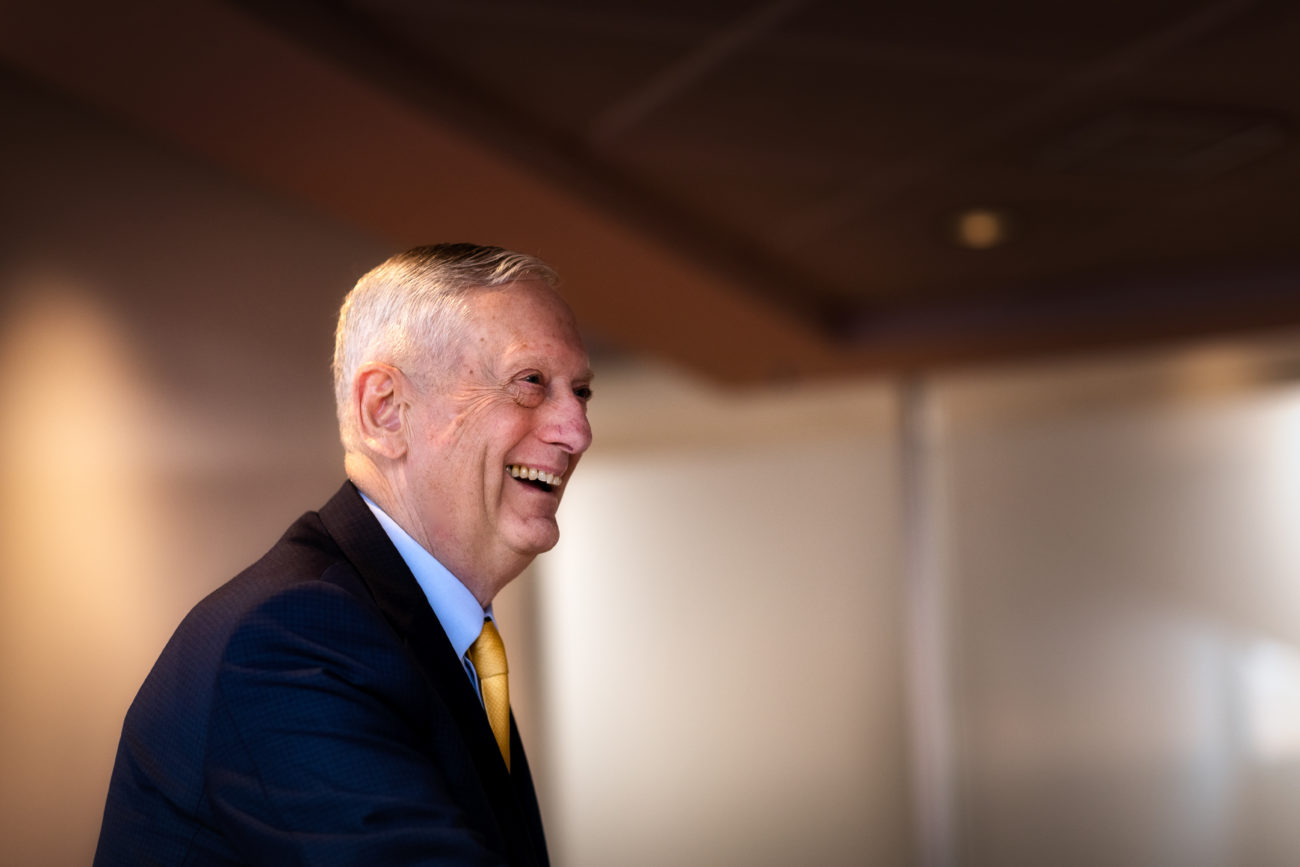
Jim Mattis doesn’t flinch.
Not when Indonesian special forces untied bags of snakes during a 2018 demonstration and then bit their heads off to impress him. Not when a protester interrupted his Jan. 21 talk “U.S. Leadership on the World Stage: Getting it Right and Healing Rifts at Home” at Utah State University moments after it began.
Mattis also doesn’t appear to eat—at least publicly. Shuttling between meetings with legislators, business leaders, and students across Cache Valley, he is fueled by soda and purpose alone. Because Mattis is on a mission.
The retired four star general and former secretary of defense is touring the country to discuss its great failure: an inability to listen to differences of opinion.
“Some of you know him as the patron saint of chaos, the warrior monk,” said Jeannie Johnson, associate professor of political science. “I would like to add another title to that list that may not sound terribly glamorous at the outset, but may be the most important thing he has done for our country across the last few years. And that is bridge builder. I know it sounds like mundane work, but it is the essential work of a great nation.”
“One of the things that he told my students was ‘listening isn’t just hearing the words of another person. Listening is listening with a mind open and willing to be changed. That’s a very different thing.” – Jeannie Johnson, CAI Director
Johnson, a former analyst for the Central Intelligence Agency and founding director of USU’s new Center for Anticipatory Intelligence, invited Mattis to speak. She considers his December 2018 resignation letter as defense secretary “a national artifact” for its focus on maintaining alliances with foreign powers.
“He carried the mantle of U.S. power, which is immense, with dignity, with good humor, with respect for our allies, and with an open mind,” she said. “One of the things that he told my students was ‘listening isn’t just hearing the words of another person. Listening is listening with a mind open and willing to be changed. That’s a very different thing. And it seems to be an art form that we have lost in this current era of our country.”
Moments into Mattis’s talk, a protester yelled “war criminal.” Mattis commended him.
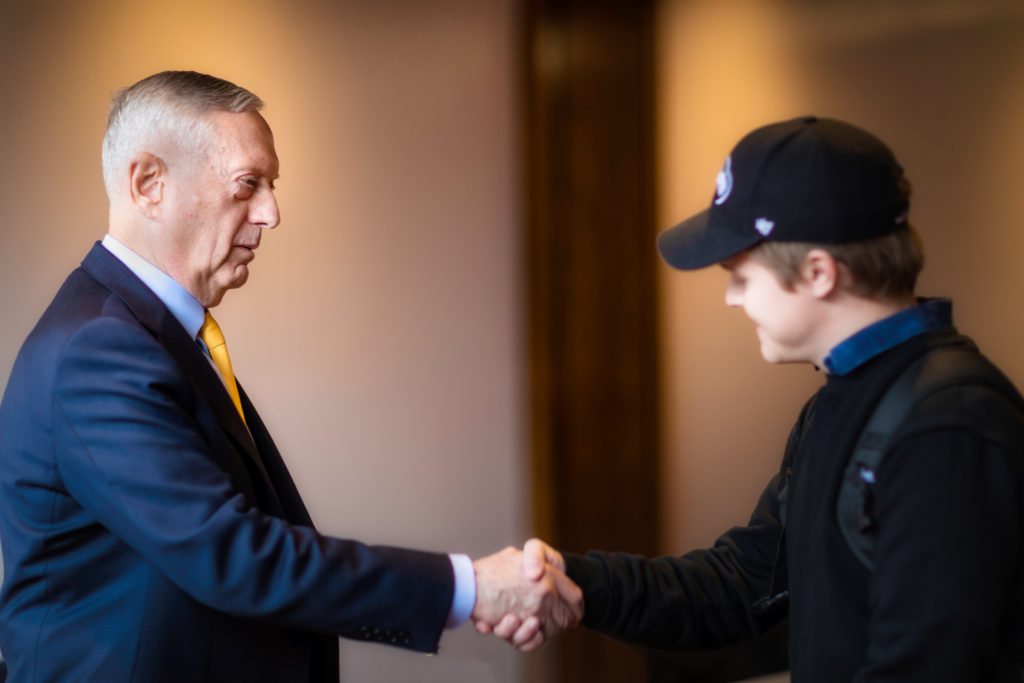
A protester interrupted Jim Mattis’s Jan. 21 talk. Mattis asked to speak with him afterwards.
“That is when America is great. That we can do that,” he said. “I guarantee you, tonight in Hong Kong, those kids over there fighting for their freedom and waving American flags don’t have the right to do that.”
As a young man, Mattis had his whole life planned. After graduating college he would teach physics and history at his high school. Maybe coach football. But life had other ideas. He spent 44 years in the Marines and served as commander of the U.S. Central Command from 2010–13. Mattis is a voracious reader and history scholar.
“If you haven’t read hundreds of books, you are functionally illiterate and you will be incompetent, because your personal experiences alone aren’t broad enough to sustain you,” he wrote in his bestselling book Call Sign Chaos.
Mattis believes understanding our nation’s complicated history can lead us out of dark times.
“You don’t just read about dates and what happened. But you really understand that human beings put themselves on the line in our revolution, writing our Constitution, fighting for civil rights, never accepting that we were complete,” he said during his talk. “We are an experiment. Just a great big experiment. We have no divine right to survive.”
Mattis listed the myriad threats the country faces. Terrorism. The theft of intellectual property by China. Nuclear programs in Russia, North Korea, and Iran. But what worries him most is the internal division back home. And yet, Mattis is optimistic about the future. Why? Our history.
“Dig through the history,” he said. “You will find the good, the bad, and the ugly. But the bottom line is there is a lot more goodness in this country—even if we don’t talk about it right now. I have absolute faith in the American people, I know the military will hold the line as we come back to fundamental friendliness … so long as we can have the kind of open discussions that allow us to work on these problems I know we can solve them. We are the greatest experiment in the history of the world.”
Afterward, Mattis spoke with the protester. He listened as the student called him a war criminal. Mattis asked why he believed that and listened as the young man explained how he read that Marines bombed a wedding party during the Iraq war. Mattis suggested he check his sources and explained what happened that day. Then he extended his hand. The student wore a pained expression and then, eventually, touched palms.
The following is a conversation with Secretary Mattis about closing the divide at home.
Kristen Munson: In a recent discussion with the Washington Post you said “I have talked about our problem, it’s the way we refer to one another, it’s the way we deal with one another. And no one person is responsible for this. There is no one person who is going to solve it either. We are going to have to do it together.” What specific actions can leaders from both sides of the aisle take to combat this growing threat of division at home?
Jim Mattis: I have actually given this some thought. There is some political action group right now that gives veterans money if they run for office, and they don’t care if they are democrat or republican. What they have to do is agree that once a week they will meet with people from the opposite party and listen and talk like normal human beings. Another thing to do is start teaching in the schools that you cannot argue an issue until you have achieved mastery of the other person’s position, which is understanding—it’s not rejection. A third thing is that we teach people a problem solving method. At U.S. Central Command, I had 77 nations in my unit. What I would do is I would say that you have to define the problem so well that everyone agrees on it. Now that is hard when you have that many nations, but it’s not impossible. And if you teach people that defining the problem is most of the work then the discussion is going to be very open-ended when you start. If I say hey, you know Dialectic, do you know who that is?
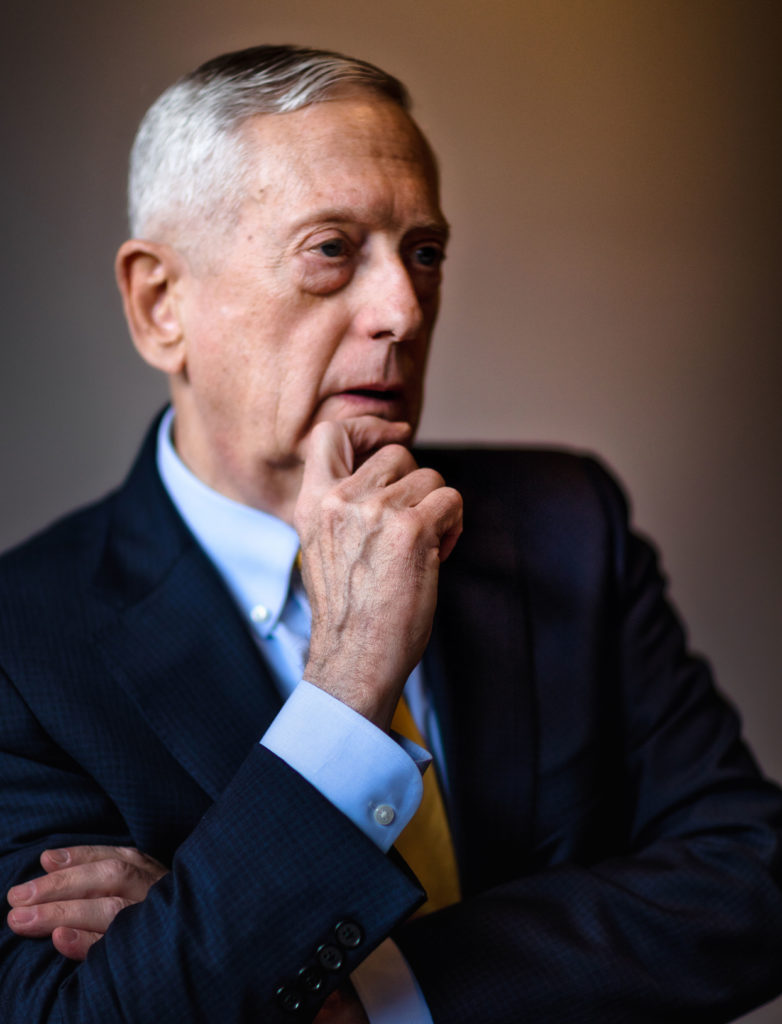
KM: No.
JM: He was a philosopher. Basically he said you always start these kind of discussions with a thesis. And then somebody comes up with an antithesis and you come out of that with a synthesis. And all that is the next thesis. It’s the way America keeps building to be a more just and responsive society. So teach people a problem solving approach. And I didn’t care when I had people [at Central Command] from Denmark and from Mississippi and Japan if theirs was the scientific method or the Socratic dialogues or the algebraic method, but they had to have a disciplined message that said we would first quantify the issue and then apply subjective thinking. And if you pragmatically teach that to people, then you get critical thinkers. And then things like racism fall because they can’t hold.
KM: While overseeing recruiting efforts for the marines in the West, you learned the value of persuasion and how to “create common ground where none seems to exist.” Are there some examples of issues or policies where you think we can do that with?
JM: Oh sure. Most of them. Except where people decide that they want irreconcilable differences. And if somebody wants something like that democracy can’t work. That is why tyrants fight and have armies and how one tyrant wins. But you take some of the most emotional issues I would say you can’t accept in courts. Courts are very brittle. Win lose, this sort of thing. Legislatures are crazy, they are sloppy. You want to go out and run three miles straight up the mountain after reading what the legislature has done, but at the end of the day the legislatures are the way to make that change.
KM: If you could pick any historical leader to advise our country at this time, who would it be?
JM: Marcus Aurelius or [Nelson] Mandela. Martin Luther King Jr. Read his Letter from Jamaica. It’s better than Letter from a Birmingham Jail.
KM: You have a reading list for military leaders in the back of your book. But if you had a reading list you were going to prescribe our country, what are a few titles that might be on it?
JM: Colin Powell’s My American Journey. Mandela’s book Long Walk to Freedom could be on. Sherman: Soldier, Realist, American by B.H. Liddell Hart—it shows that one person can make a difference. Probably skip Jo Africanus [Joseph Chamberlain]. Barbara Tuchman The Guns of August because it warns why you want to do things and why you don’t want to do things.
“I don’t even know how deeply held some of this hatred is, which is what gives me hope too. That we can overcome it.” – Jim Mattis
KM: You close your book saying that “we all know that we’re better than our current politics. Tribalism need not disrupt our experiment.” What is one thing every single person in the room today can do take a step forward?
JM: Defend people who are saying things you disagree with and who are being berated for their opinions. I am not talking about a good old fashioned argument “I think you’re wrong and here is why,” that sort of thing. I mean where people are condemning someone’s parentage. The kind of stuff that passes for intellectual talk in this country now by our woeful political class. A marine infantry squad wouldn’t tolerate it. Leaders are supposed to be grown men and women. So I would say everyone has got to look for a place where someone they disagree with is being attacked and defend their right to say it. Every time they see it. No more saying “Your words are beyond the pale” or “you’re unAmerican,” “you’re an enemy of the state,” “you’re an enemy of the people.” You can’t sit there, you have to defend them.
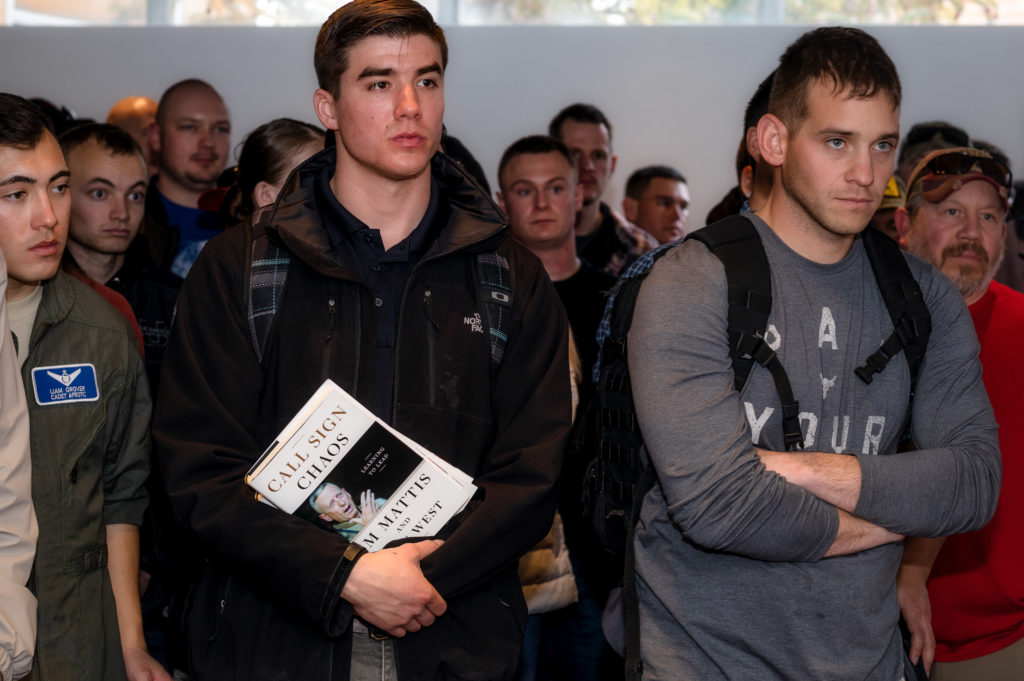
Veterans and active duty military personnel were invited to meet with Mattis after his Jan. 21 talk.
KM: Warfare adapts. In your book you wrote about the harm disinformation campaigns did to the U.S. military forces. It’s 2020. An election year. Do you see disinformation campaigns at home having a similar effect on the American electorate—harming its ability to fight for its future?
JM: You have to be careful because you don’t want to start squeezing freedom of speech between two candidates who are arguing about things, but when you see servers in Denmark that are being routed from Kazakhstan, with the same fingerprint that we saw out of St. Petersburg in the last election, we are not naive about it. In other words, when we see foreign penetration coming, we have got to do something about it. It’s a big danger.
KM: A question you put to your marines: What bothers you at night?
JM: The way we treat one another as Americans now.
KM: What do you think changed? You wrote about how after WWII the Greatest Generation seemed more able to trust one another. Is that just what happens after you’ve been through something traumatic?
JM: No. It’s a choice people are making. But I think that the technology has now allowed people to get brave where they aren’t really. They would never say it publicly, or right to your face. They wouldn’t say it to me to my face. I should show you some of the hate mail I get. It’s just vicious. And to me, it’s just punks. If they really believed it, “come on out, confront me if you really think I did those things.” But most of it, it just seems to be the kind of things you do knowing you are not going to be held accountable. So I don’t even know how deeply held some of this hatred is, which is what gives me hope too. That we can overcome it.
Visit CAI’s website to watch Jim Mattis’s address at USU. All photos by John DeVilbiss.





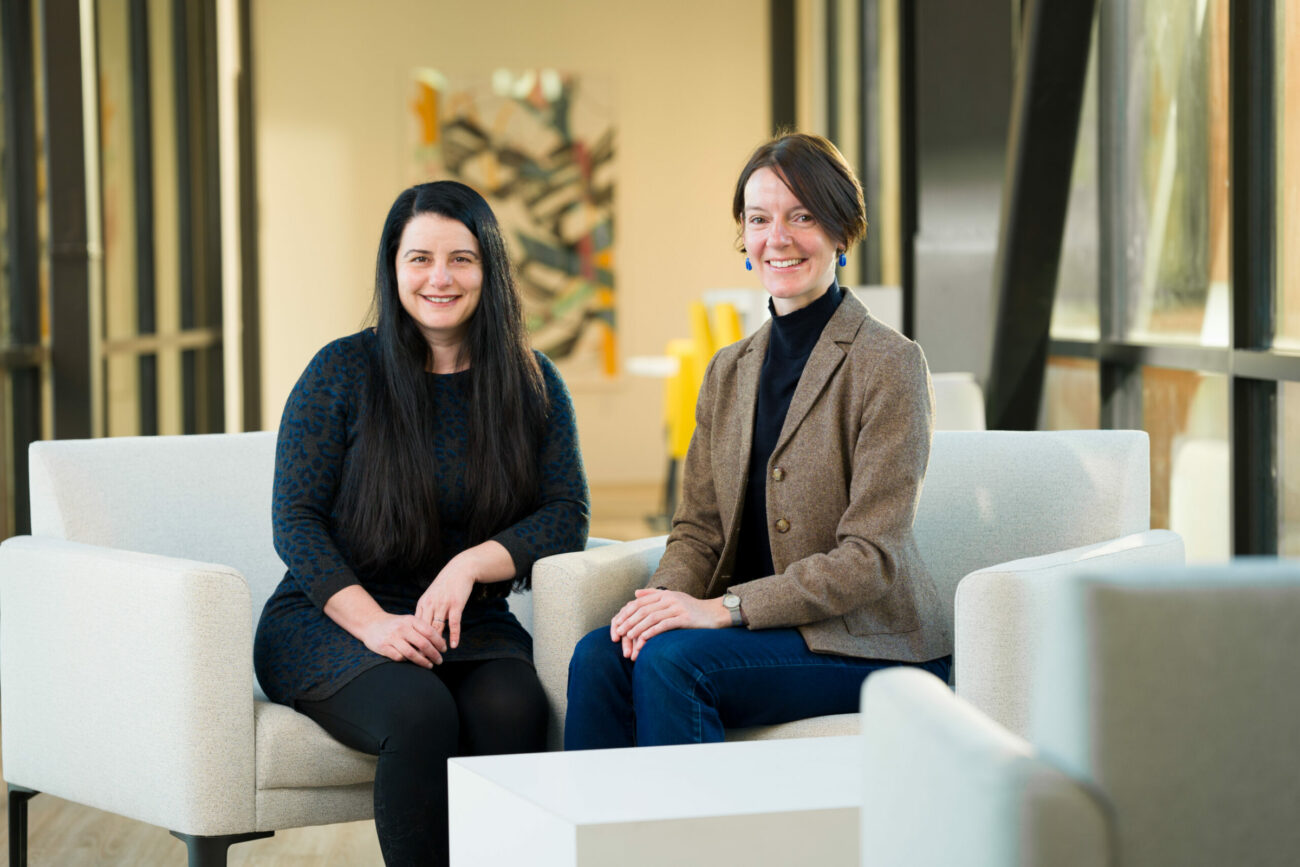

Allan Gross U.S.U. 64-69 May 5, 2020
What an honor having General Mattis speak at USU. And his message is so relevant in the here and now.